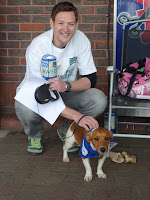- You can discover exactly what breeds make up your dog by a sample of their saliva
- The RSPCA is more than 180-years old and pre-dates the police
- Some people think it’s a good idea to dye their pets and ‘fur-jazzle’ them.....
But the thing that struck me most, and will stay with me forever, is my discovery during an induction chat with Tony Woodley, the RSPCA inspectorate’s communications and liaison officer, how many incidents each RSPCA officer deals with on a daily basis.
I already found it staggering that the RSPCA handles 1.2 million calls a year, but when I saw in black and white how those calls are shared amongst just 340 frontline staff, it really brought it home to me what a never-ending mission the inspectors, and the Society, faces.
I met with lots of other RSPCA staff and departments during my first week.
I was shown stomach-churning photographs of emaciated dogs by staff in the prosecutions department, discovered that rats need their tails to control their body temperature during my chat with the companion animals department, and learned from the wildlife team that meerkats do not make good pets.
At the end of the week I had a bulging notepad of information and links to reports, guides and sections of the RSPCA website I need to read through to build up my knowledge of animal welfare and the RSPCA’s work.
I have come to the RSPCA from a very small company of just two people. so it will take me some time to get used to working as part of a larger organisation - and remember everyone’s names and what they do!
But now I can better appreciate how all the different departments have a vital part to play.
It’s clear from everyone I have spoken to, no matter which department they work in, that their number one priority is always improving animal welfare.
I’m really looking forward to playing my part in that team effort raising awareness of the RSPCA’s goals and ambitions to help animals.
Cat Peerless, RSPCA press officer





